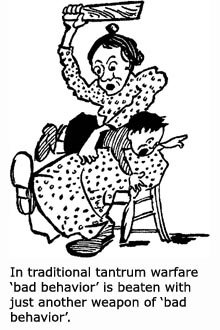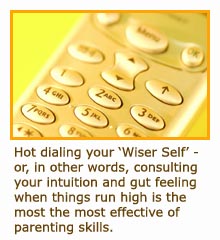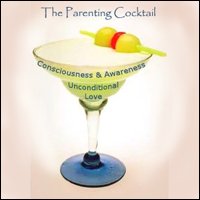Effective Parenting Skills:
Nothing Kills a Tantrum Better than Unconditional Love
• If you're searching to learn effective parenting skills that aim at better controlling your kids and getting instant obedience ...
• ... This is not the place!
• However, if you want to
explore parenting skills that take parenting a step further than the short term instant obedience issues, please, join this journey of how to raise responsible, conscious and happy kids!
• In this positive parenting article I will share with you my absolute top most efficient tool in "killing bad behavior" or a toddler tantrum, namely:
• Unconditional love, strong intuition, support, respect and patience!
• "H'mm", you might think, those aren't effective parenting skills, sweet or spiritual perhaps, but not effective, surely.
• Well, in my experience they are the absolute most effective
skills around.
• I hope you'll read on to see what I mean and try for yourself by filling out my parenting worksheet!
Recognize This?

When we experience bad behavior in our children or our kid throws a hysteric toddler tantrum, it always seems at the most inconvenient of times and places, right?
Tantrums always seem to happen when we really want our kid to obey and do as he or she is told!
Plus when it happens, we're often stressed and tired and our tolerance level has hit rock bottom.
In other words, it's all too much and we want and need it to stop right NOW.
Inside we feel so frustrated and helpless that we feel the easiest way out of this mess is to verbally or physically 'squash' the tantrum to make it go away (yelling, shouting or perhaps even for some shaking or spanking).
Desperately we think: "Where the heck are those effective parenting skills when we really need them", right?
Relax, Temper Tantrums Are Completely Normal!
Well, first of all rest assured; temper tantrums are a completely normal way for small children to express their difficult emotions. I mean think about it, which variety of means does a toddler have for expressing frustration, fatigue, hunger, sadness and pain?
Not many!
Therefore, your child isn't bad for throwing a fit. An occasional fit is completely normal ... and healthy. Try not to be scared or provoked by your child's emotions. They're just an expression of something else, typically a need of some sort.
Finding and empowering yourself with your inner anger management resource is easier than you think!
Why?
Because the best solution to temper tantrums is always based in deep love and unconditional acceptance. And that we can all do if we set our will to it! Enrich yourself with a deeper knowledge of the nature of temper tantrums and find out when they're completely natural and when they may an indication of a deeper emotional problem.
Why 'Killing' Your Kid's Frustration with another Weapon of Frustration Does not Work!
So what's really going on when we react this way? And why doesn't it seem to work?Well, to see this more clearly let's try and take the proverbial position of the fly on the wall.
What the fly sees is a kid that screams and shouts and an adult that does the same.
In other words the parent is with his or her yelling, scolding or spanking trying to kill bad behavior with bad behavior.
Or you could say that the parent is using his or her frustration to make another frustration (the kid's) go away.
When / if we use this quite common parenting technique 'outmatching bad behavior' it may 'kill' the tantrum, yes, but only because we're bigger - the parent frustration has more power and force than the toddler tantrum.
It may be instantly effective, but it doesn't feel good, does it?
Scolding and making our kid even more miserable doesn't give us a good feeling inside.
The reason for this is simple:
This parenting solution does not heal the situation - it just forcefully knocks it unconscious.
It doesn't make the reason for your kid's bad behavior or your toddler's tantrum go away.
What I would love to show you in this positive parenting article is how the most effective parenting skills (unconditional love and acceptance) may not only bring bad behavior in children to an end it also meets the need that lies behind the behavior.
More about these important needs in a little while.
The Traditional 'Weapons' in the 'Tantrum Wars'!

My experience has taught me that the most effective parenting skills to deal with bad behavior in children or my son's toddler tantrums are not meeting frustration with desperate control techniques such as:
- Harsh words and shouting.
- Threats or bribes.
- Ignoring or looking the other way
- Physical punishing
- Holding affection back as emotional punishment
These reactions will only make my kid feel disempowered and unloved.
I don't want respect out of my child because he fears me or fears not getting my affection. I would want respect from my kid because he feels like giving it to me!
The Philosophy "Make Love not War" Is Smarter Than We Think!
In my experience nothing kills a tantrum better than showing unconditional love and acceptance.This does not mean giving in to what your kid wants - no, it means giving in to what your kid needs!
(Needs could be affection, touch, attention, a level of autonomy etc.). (Read more about the important difference between 'needs' and 'wants' in this positive parenting article.
It means that the most effective parenting skills are about showing your kid that you love him or her irrelevant of how he or she kid behaves ... even when you kid is 'bad'!
Yes, I mean that!
And the reason is this:
The Ultimate Dream Scenario
All children act out and become angry at some point. My son does too!So wouldn't it be wonderful if we could 'kill' the tantrum while making your child feel loved at the same time?
Stopping our children from acting out and while still preserving their sense of self esteem?
Isn't that the ultimate parenting dream?
So how do we do this?
Here are some effective parenting skills tips as to how I personally deal with my son's behavior when he throws a fit / toddler tantrum:
Effective Parenting Skills List
1) Hot Dialing Your Parenting Intuition

- The very first thing I do when my son has a crisis is that I mentally 'lift' myself out of situation, so to speak. Just for a short moment in order to ask myself, my gut feeling and intuition (my Wiser Self, you could call it):
"What is it my son needs?"
(Not, what he wants but what he needs - in my experience there's always a hidden need behind any tantrum).
For instance:
Does he need me to pay attention?
Does he need to bond physically?
Does he need to have a say in what happens?
Is he tired or hungry etc.? - When I have localized the need, I try to fulfil it the best way I can.
- Sometimes I can't localize it (for instance if I'm very tired or stressed it's difficult to 'contact' my intuition) but then I just try one thing after the other until something works.
2) Extinguish the Need for Attention with Your Shower of Unconditional Love
 The situation:
The situation:
When my son was about two, cooking in the evening could be quite a challenge. My son would be tired after a long day of day-care and he hadn't seen his mom all day.
So he was not happy with me cooking and not paying him enough attention. He would cry and tug my pants.
The challenge here was to not react to the expression of need (the crying and whining) but reacting to the need itself.
In this situation my son's needs were to:
• Get my love and attention, feel seen and touched ... and get fed!
My way of meeting these needs were to:
• Accept his cry for attention and affection and meet his need for me as much as possible!
This sometimes meant:
- Turning off the frying pan just to sit with him for a few minutes before returning to cooking.
- Involve him in some level of the cooking (e.g. putting food into bowls and plates).
- Initiate an interesting game in the kitchen while I was cooking.
- Letting him chew on something light like cucumber so that he wouldn't be too full for dinner.
3) Feed the Need for Respect and Understanding with Your Deep Presence and an Explanation
The situation:
One day, my dad, my son and I were out driving in my parents' car. My dad was the chauffeur and I was in the back next to my son.
My dad turns on the radio to listen to the traffic news to see which way would be the most convenient to take in order to avoid traffic jam.
After a short while my 3 year old son starts to complain: "No, I don't wanna listen to that. Granddad must turn it off!"
Now, the easy way out would be to just get my dad to turn it off. However, is it the right thing to do? No, it didn't feel like the right thing to do!
Why?
Because turning it off would mean more 'serious' consequences in the long (the risk of sitting in a jam for hours). So yes, I overruled my child's need for quiet but the consequences (long traffic jam) outmatched the short term ones (2 minutes of 'noise' from the radio).
So, we didn't turn off the radio!
Well, as you can imagine this was not popular with my son.
He starts to cry and become angry partially because he doesn't get his will and partially because he doesn't understand why!
In this situation my son's needs are to:
• Understand what's going on and feel respected!
My way of meeting these needs are to:
• Give him my full presence, looking him deeply in the eyes while giving him a thorough explanation!
I said something along the lines of:
"Listen to me, look at mom (eye contact is crucial). Granddad really wants to listen to the radio. Granddad needs to hear the news because we need to know if there will be a traffic jam. Because if there is a traffic jam ahead we will have to drive another way home. We don't want to sit in a traffic jam for hours on end, do we? So for the next two minutes granddad needs to listen to what the man on the radio says."
Now, my son didn't catch all the nuances of my explanation but the deep eye contact and full presence made him feel respected. He wasn't happy about the decision but the full explanation made him feel seen and heard. I kept talking to him until I could feel that he had accepted the situation without feeling rejected.
4) Fuel Autonomy and Responsibility
with Your Calm and Patience
The situation:
My son is about to have a bath. He's still at the stage when taking his clothes off and on is a real challenge.
I see him struggling with his t-shirt and getting all caught up in it like a spider in its own web.
I ask him if he wants me to help him. I don't really get a response other than some muffled sound of frustration.
I come over and I hold out his sleeve so that he can pull out his arm more easily.
Well, biiiig mistake.
He becomes very angry and frustrated with my intervening.
In this situation my son's needs are to:
• Try to see if he can do it by himself (developing the feeling of 'I can') and choose himself when and if he needs my help!
My way of meeting these needs are to:
• Step back, remain calm and amour myself with what feels like patience worth a gold medal.
Looking at him, I know he can't do it but the important thing here is to let him try his best to solve his own problem (that's what we want for an adult as well isn't it?)
So I sit down and I patiently wait with my hands in my lap.
Then at some point after a lot of fruitless attempts he says: "Mom, help me!"
Now he's willing to listen to my suggestions because he was ready and reaching out for help was his own choice!
But Hey, What About Consistency, Firmness, Rules and Serious Stuff Like That?
To me, they are secondary!
And you know why?
Because nothing comes before showing unconditional love, acceptance and respect to your child.
This position is most clearly and radically expressed in the inspiring parenting style of unconditional parenting. Unconditional parenting is about looking at your kid with an unconditional positive regard.
That is not to say that basic consistency and firmness in the right situations aren't important, they most definitely are: They install a healthy sense of security and reliance on you in your kid.
But my point is that if we strive to meet our kids' needs on an overall level, consistency and firmness will be applied naturally when 'needed', you see? (Perhaps, in some situations, your child's need is consistency).
If your kid has some recurrent tantrums in specific situations, writing a parenting worksheet may be a good way to think of alternative ways of dealing with 'bad behavior in children'.
Your Own Effective Parenting Skills Worksheet
First I will present you with a non-extensive list of basic needs that your kid might have in the specific situation (the tantrum or crisis):
These are just suggestions. They are the typical needs I meet in my child:
Feel unconditional love - feel basic trust - feel secure (things / you are predictable, consistent) - attention - affection - autonomy (I want to do it by myself) - hunger - respect - exercise free will / make choices - explore - sleep - touch
Here's what you do:
You take a piece of paper and you write:
|
I hope you found my positive parenting tips about how to approach bad behavior in children and toddler tantrums useful.
You're more than welcome to continue your visit on my positive parenting website - se more closely related parenting articles below!
Your Positive Parenting Ally,
Birgitte

Want to stay in touch and get the latest news?
Sign up
for my free newsletter
Parent Coaching
- For Inner Peace, Clarity and a Deeper Connection to Your Child
 Being a parent can feel like a double-edged sword. Life with kids may feel like the greatest gift you have ever received, while at the same being hugely challenging, often leaving you confused, stressed and overwhelmed.
Being a parent can feel like a double-edged sword. Life with kids may feel like the greatest gift you have ever received, while at the same being hugely challenging, often leaving you confused, stressed and overwhelmed.
When we feel like this, we've lost touch with ourselves. We can't hear our own inner voice, and it's difficult to know what is 'right' for us and how to act.
I offer in-depth parent coaching to help you regain your balance and get back in touch with yourself. From a place of inner peace and clarity, your will find your own answers which will help you reconnect with your child from a place of unconditional love and acceptance.
Read more about my parent coaching here.
Where Would You Like to Go Next?
 Good Parenting Skills For the Conscious, Open-minded Parent! |
 What Makes a Good Parent? A Strong Cocktail of Consciousness and Love: Knowing What You Want for Your Kids and Being Those Qualities Yourself! |
 Healthy Parenting Insights: Reduce Potential Child Health Problems with a Physiologically Healthy Lifestyle. |
 Learn to Use Parental Intelligence in 5 Simple Steps: Expert guest post by Laurie Hollman Ph.D. - solving bad behavior in children with a conscious self-reflective mindset. |
 Perfect Parenting: My Less-than-Perfect Parenting Oops'es! |
Back to the top of this page about Effective Parenting Skills: Nothing Kills a Tantrum Better than Unconditional Love
Go to the Positive Parenting Ally Homepage







